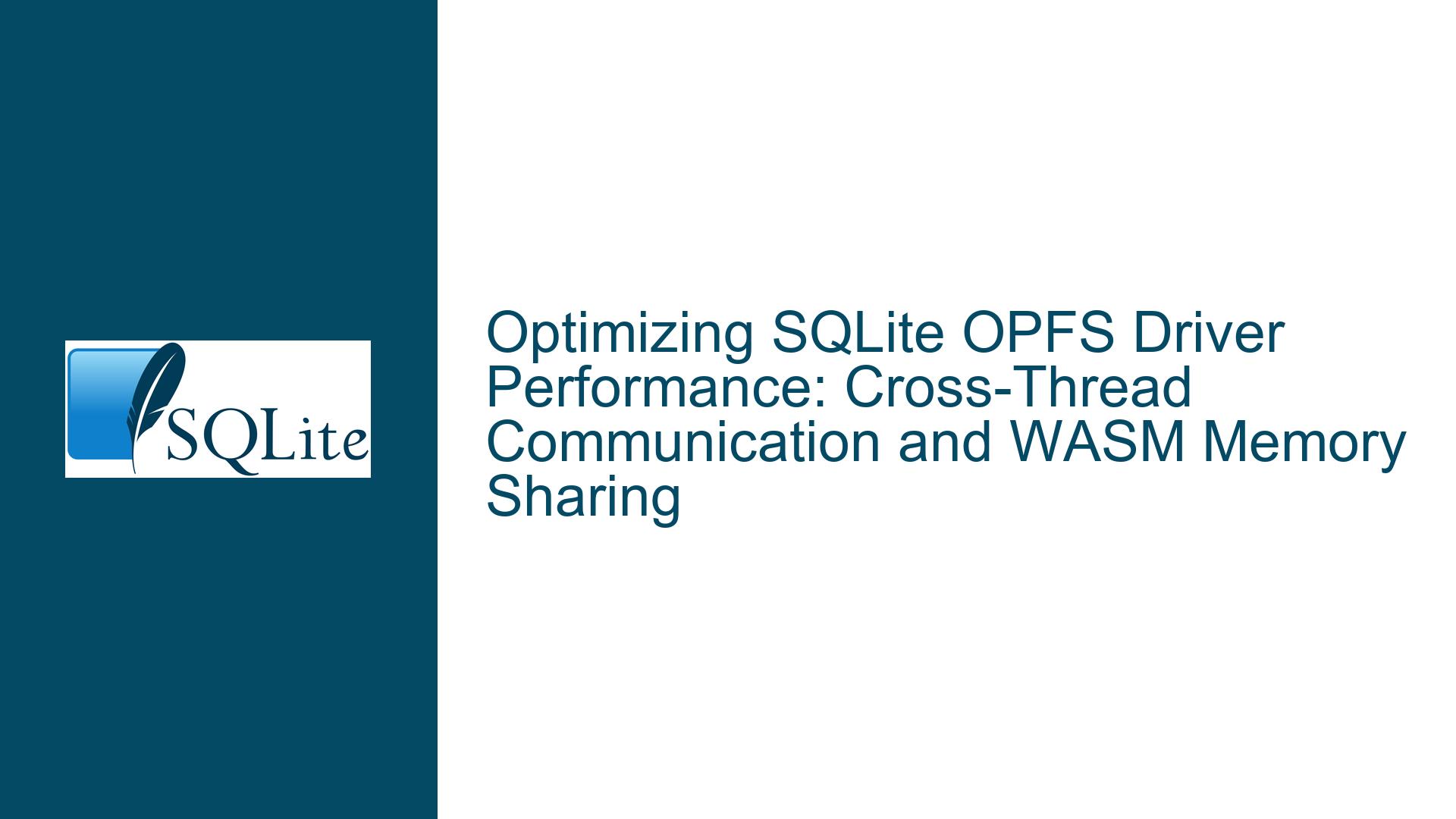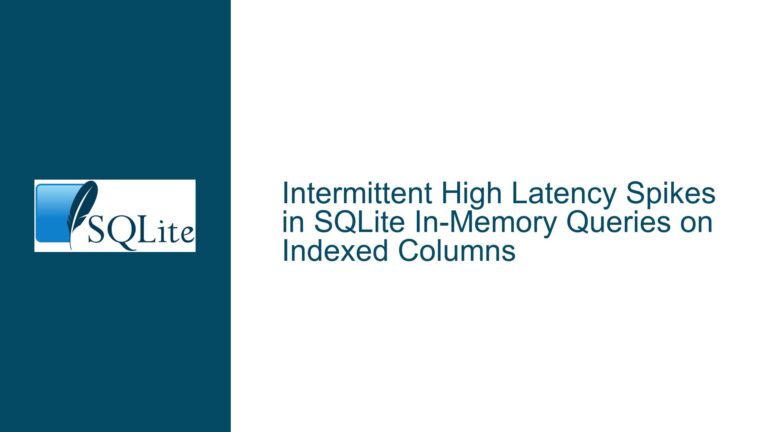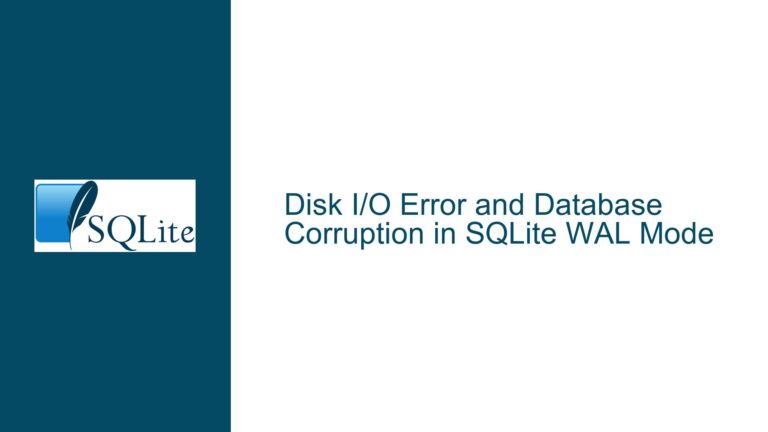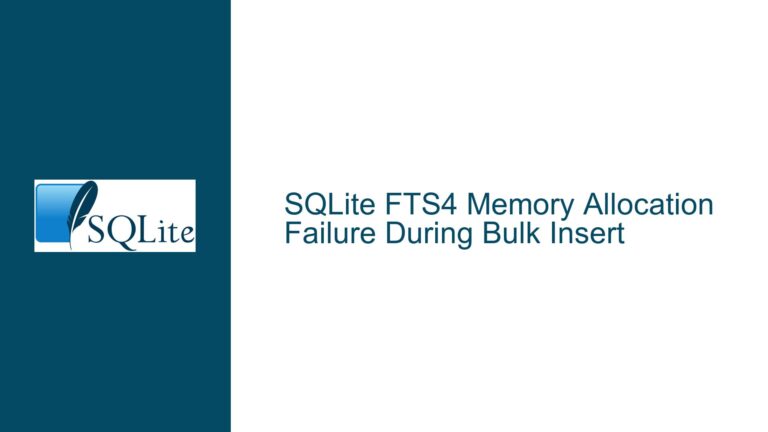Optimizing SQLite OPFS Driver Performance: Cross-Thread Communication and WASM Memory Sharing
Cross-Thread Communication Overhead in OPFS Driver
The core issue revolves around the performance bottleneck in the SQLite OPFS (Origin Private File System) driver, where approximately 30-35% of the runtime is consumed by waiting at JavaScript’s cross-thread communication boundaries. This overhead is primarily due to the serialization, synchronization, and deserialization of method calls between the SQLite Worker and the OPFS Worker. The current implementation uses the opRun() function to handle all VFS (Virtual File System) methods that require OPFS calls, which introduces significant latency. The primary methods affected are xWrite and xTruncate, where the synchronization overhead is most pronounced.
The opRun() function serializes the method call, synchronizes with Atomics, and then deserializes the result. This process is necessary for error reporting and ensuring data consistency, but it introduces a significant delay. The xWrite method, in particular, is heavily impacted because it is called frequently during database operations. The synchronization mechanism ensures that each write operation is confirmed before proceeding, but this comes at the cost of performance. The xTruncate method, while less frequently called, also suffers from the same overhead, albeit to a lesser extent.
The current implementation’s reliance on opRun() for all OPFS calls means that every operation incurs the cost of cross-thread communication. This is especially problematic for write-heavy operations, where the cumulative latency can become substantial. The issue is exacerbated by the fact that JavaScript’s cross-thread communication is inherently slow due to the need for serialization and deserialization of data. This is a fundamental limitation of the JavaScript runtime, and while it cannot be entirely eliminated, there are ways to mitigate its impact.
Possible Causes of Performance Bottlenecks
The performance bottleneck in the SQLite OPFS driver can be attributed to several factors. The primary cause is the reliance on JavaScript’s cross-thread communication for all OPFS calls. This communication is inherently slow due to the need for serialization and deserialization of data, as well as the synchronization mechanisms required to ensure data consistency. The opRun() function, which handles all OPFS calls, introduces additional overhead by requiring synchronization with Atomics for each call.
Another contributing factor is the lack of streaming for write operations. Currently, each xWrite call is handled individually, with synchronization occurring after each call. This means that the SQLite Worker must wait for confirmation from the OPFS Worker before proceeding to the next write operation. This sequential approach introduces significant latency, especially for write-heavy operations. If the writes could be streamed to the OPFS Worker without waiting for synchronization after each call, the overall performance could be improved.
The use of postMessage for communication between workers also contributes to the performance bottleneck. While postMessage is a convenient way to communicate between workers, it is not the most efficient method for high-frequency, low-latency operations. The structured cloning algorithm used by postMessage introduces additional overhead, especially when transferring large amounts of data. This overhead is particularly problematic for xWrite operations, where large buffers of data need to be transferred between workers.
The lack of shared memory between the SQLite Worker and the OPFS Worker is another factor that contributes to the performance bottleneck. Currently, all data transfers between workers require copying the data from one worker’s memory space to another. This copying process introduces additional latency and consumes CPU resources. If the workers could share memory, the need for data copying could be eliminated, leading to significant performance improvements.
Troubleshooting Steps, Solutions & Fixes
To address the performance bottlenecks in the SQLite OPFS driver, several potential solutions can be explored. The first solution is to implement streaming for write operations. Instead of handling each xWrite call individually, the SQLite Worker could stream the write operations to the OPFS Worker without waiting for synchronization after each call. This would allow the SQLite Worker to continue processing other operations while the OPFS Worker handles the writes in the background. The synchronization could then be deferred until the xSync method is called, at which point any errors could be reported.
Implementing streaming for write operations would require changes to the opRun() function. Instead of synchronizing after each xWrite call, the function would need to queue the write operations and send them to the OPFS Worker in batches. The OPFS Worker would then process the writes asynchronously, and the SQLite Worker would only need to synchronize when the xSync method is called. This approach would significantly reduce the latency associated with write operations, especially for write-heavy workloads.
Another potential solution is to use postMessage with buffer transfer to minimize the overhead associated with structured cloning. The postMessage API supports the transfer of ArrayBuffer objects, which can be used to transfer large buffers of data between workers without the need for structured cloning. By using buffer transfer, the overhead associated with data copying can be minimized, leading to improved performance for xWrite operations.
However, using postMessage with buffer transfer has its limitations. One limitation is that the event loop cannot be blocked while waiting for a response from the OPFS Worker. This means that the SQLite Worker must use non-blocking mechanisms to wait for the OPFS Worker to complete the write operations. This can be achieved using Atomics.waitAsync(), but this API is not supported in all browsers, particularly Firefox. To work around this limitation, a hybrid mechanism could be implemented that uses postMessage for non-blocking communication and Atomics.waitAsync() where supported.
Another potential solution is to share all of WASM memory between the SQLite Worker and the OPFS Worker. By using a SharedArrayBuffer, the workers can access the same memory space, eliminating the need for data copying. This would allow the OPFS Worker to directly access the data in the SQLite Worker’s memory, reducing the latency associated with data transfers. This approach would be particularly beneficial for IO-heavy operations, such as large inserts, big table scans, and VACUUM operations.
Implementing shared memory would require changes to the SQLite WASM initialization code. The Module.wasmMemory property would need to be set to a SharedArrayBuffer, and the workers would need to be configured to use this shared memory. This approach would also require careful synchronization to ensure that the workers do not access the same memory locations simultaneously, which could lead to data corruption.
In addition to these solutions, it may be worth exploring the use of alternative VFS implementations. The current OPFS VFS is designed to be compatible with legacy systems and filesystem transparency, but it may be possible to create a new VFS implementation that is optimized for performance. This new VFS could use different mechanisms for cross-thread communication and data transfer, potentially leading to significant performance improvements.
Finally, it is important to note that some of these solutions may be incompatible with certain SQLite features, such as pragma synchronous=off. This pragma disables synchronization after each write operation, which can improve performance but also increases the risk of data corruption in the event of a crash. If the proposed solutions are implemented, it may be necessary to deprecate or modify this pragma to ensure data consistency.
In conclusion, the performance bottlenecks in the SQLite OPFS driver can be addressed through a combination of streaming write operations, using postMessage with buffer transfer, sharing WASM memory, and exploring alternative VFS implementations. Each of these solutions has its own trade-offs and limitations, but together they offer a path to significantly improving the performance of the SQLite OPFS driver.






